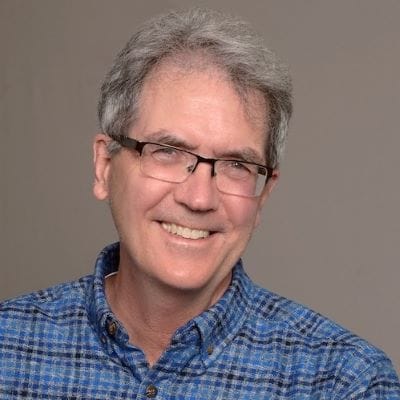Four Former KC Mayors Talk Shop at Plaza Library Event
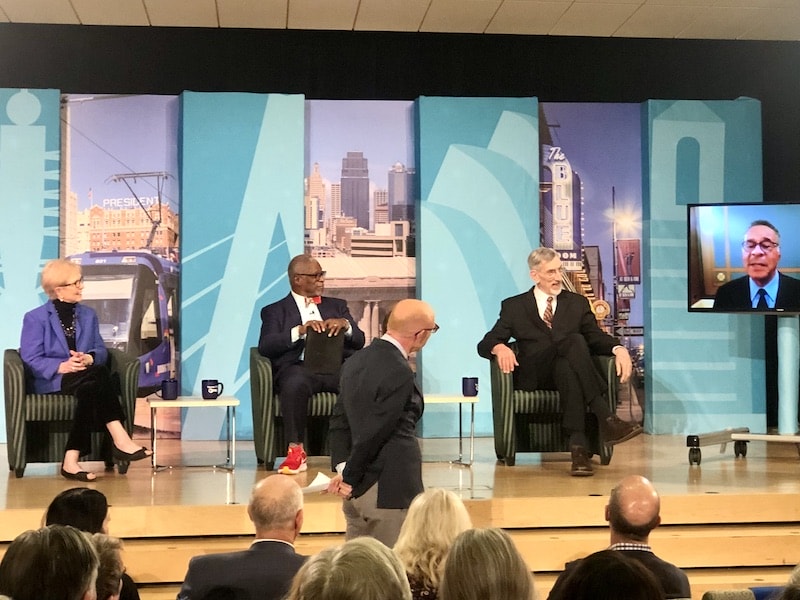
Published January 30th, 2023 at 12:30 PM
By Kevin Collison
It was a unique gathering last week when four former KC mayors discussed the perennial issues confronting the occupant of City Hall’s 29th floor including crime, East Side redevelopment, affordable housing and Jefferson City.
The executive quartet brought together at the Plaza Library by KCPT-19 and the Citizens Association covered a lot of ground. It will broadcast in its entirety on KCPT Week in Review this Friday (Feb. 3) at 7:30 p.m.
Unfortunately, Mayor Emanuel Cleaver (1991-1999) only made a brief appearance at the beginning of the event via a video hookup from Washington, saying his Congressional duties required him to keep his time short.
But Mayors Kay Barnes (1999-2007), Mark Funkhouser (2007-2011) and Sly James (2011-19) devoted more than an hour to talk about the their triumphs and frustrations, their approach to governance and the unfinished business that remains in Kansas City.
Here’s an edited summary of some of their discussion:
Downtown redevelopment?
Barnes: “I was known by a few, and I’ll fight to my dying breath to oppose this, as queen of TIF.”
When asked by moderator Nick Haines about the Power & Light District, a lynchpin of her downtown revitalization push that’s still requires a hefty city subsidy, she replied:
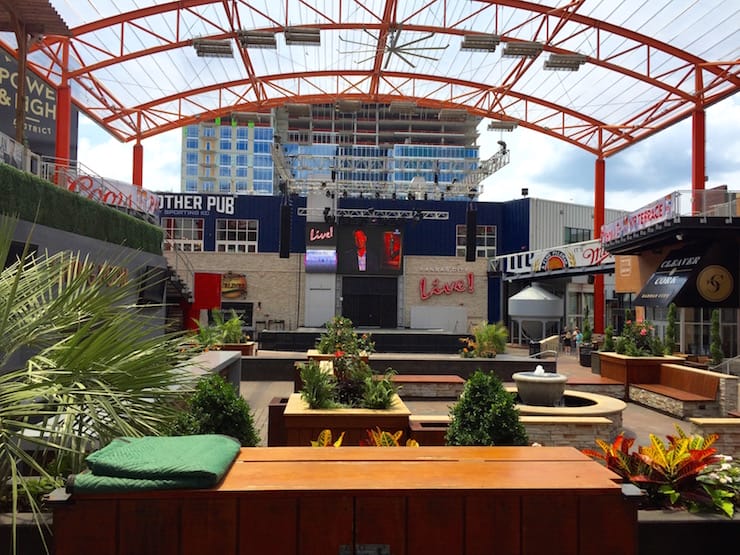
The Kansas City Live! block in the Power & Light District was part of major redevelopment push by the city during the first decade of the new century.
“I’m not sure what might have been done differently other than to have forecast the economic downturn that occurred that precipitated much of what you’re referring to.
“I think the advantages, the pluses, far, far outweigh any negatives and I would challenge anyone who would suggest that was money misspent.
“If you look at all the development and redevelopment and the jobs that have been created as a result of those projects we are much better off as a city that we otherwise would have been.”
James: “I’m going to come to her (Barnes) defense. I remember what downtown looked like before she got her hands on it…It was strip clubs, haunted houses, vacant parking lots with oil stains, and rusted metal rope where nobody wanted to be after 5 o’clock.
“Here’s what happened. When the stadiums were built, when the airport was built, when all that was done, people said ‘oh, we’ve done enough, and they stopped and downtown went down the hill.’
“Downtown is the heart of the city, it’s the economic engine that pumps blood to the extremities. If you don’t have an engine pumping blood to the extremities, the extremities will die.
“I give Kay Barnes tons of credit for having the guts to take the crap from people who didn’t know diddly about tax incentives or TIF from abatements to do what she did. Because if she hadn’t done it, we’d still be looking at a downtown that sucked.”
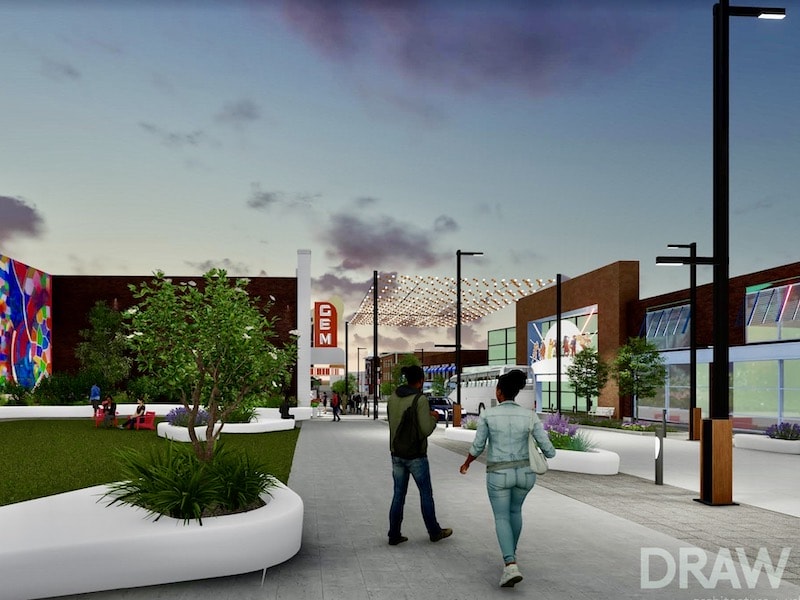
The new 18th and Vine Pedestrian District will remove curbs and smooth 18th Street to become a seamless corridor with wide sidewalks and two lanes of traffic. (Rendering by DRAW Architecture)
On redeveloping the East Side?
James: “To think there’s going to be a Loews hotel at 31st and Montgall is not very likely. What we can do is help spur economic activity in those areas with smaller projects.
“One of the impacts of systemic racism, is the people who make the investments in those projects, 98 percent of them are white and come from well-heeled circumstances.
“There’s not the same number of Latino, women and African-American people who have the resources to make the investments in their community so there has to be some help to get there.”
Barnes: “When you say (city) money is available, I wish that was true in the sense of developers in the private sector willing to take the higher risks working with the public sector working on development projects.”
“There is a challenge of developing adequate public-private partnerships to address those development and redevelopment needs.
“It’s a very complicated formula…to put together programs and projects that can succeed with adequate private investment…it’s an area that I regret I was not able to do more.”
Crime?
Funkhouser: “During my time, we had a 20 year low in violent crime in Kansas City, but it’s back about as bad as its been.
“On crime, there are three things. You need to do those intervention programs, things we had like Aim4Peace…the problem is we haven’t done them in sustained way and well funded way.
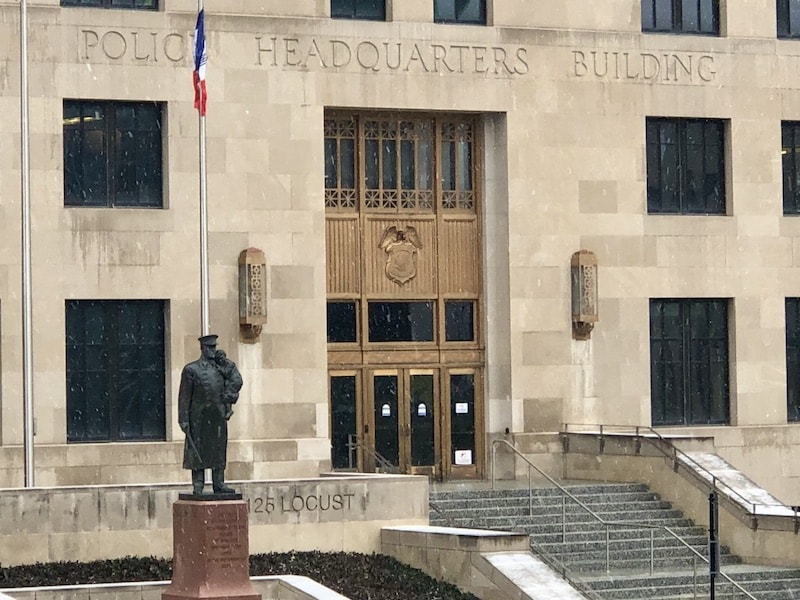
The Kansas City Police Department is run by a five-member commission appointed by the governor. It’s the only police department in the country not directly run by its city.
“The second thing you need to s focus on case clearance rate, not just for homicides but for every violent crime. When you’re looking at measuring the police department performance the case clearance rate is critical.
“The third thing is you need a very strong, tight relationship between the police and the citizens. Police tend to be insular, they tend to form a culture that looks inside and that doesn’t work. They need to be connected to the community.”
Local control of the police department?
James: “I firmly believe in local control of the police department. I said when I was on the police board if they ever try to go to Jefferson City and pass the legislation…that allowed police officers to live outside the city that I’d basically burn their houses down.
“You should not have a badge and a gun in our city if you don’t think enough of it to actually live there.
“I will never denigrate the job of police. However, I also know that if you don’t have the ability to have some impact on how the police department polices than you can’t figure out how to do things differently.
“Right now this city has not control over how they police, what they have is control over the check book and that’s about it.”
Funkhouser: “You can’t be the only city in the country that doesn’t have control. Kansas City is a city of a half million people and you don’t have your own police department?”
Affordable housing/homelessness:
Cleaver: “The federal government doesn’t do what it should do. We are woefully inadequate as a federal government in giving the dollars to public housing authorities that they need.
“The problems we see in Kansas City exist in every major city in this country with affordable housing…We had the solution in Build Back Better, but were unable to get it approved. It would have put $160 billion in HUD to deal with this problem.”
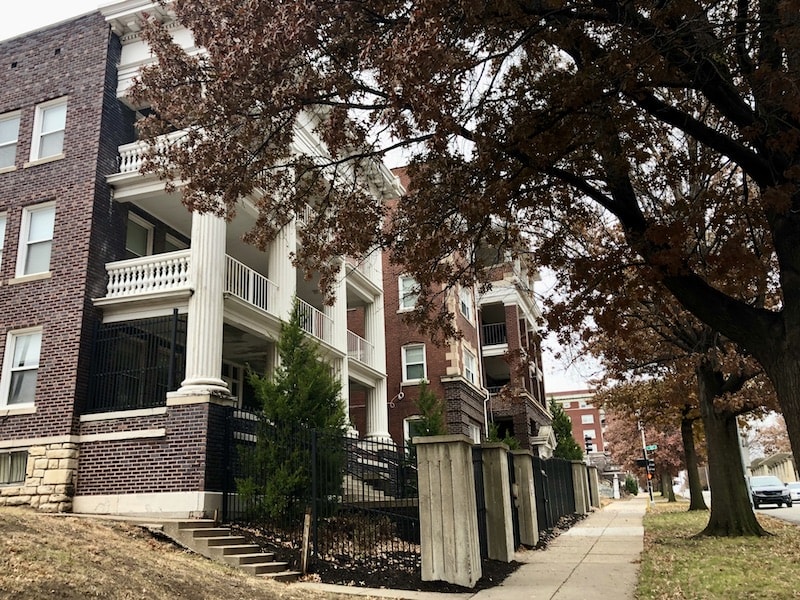
The Jazz Hill buildings along The Paseo are now being renovated to become affordable housing, they were completed between 1896 and 1906.
James: “The problem is to some extent there is a tide that we don’t have a big enough wall to stop called the economy. As people don’t have the money to exist, housing prices go higher, there’s going to be more people on the street.
“You have to remember, the federal government and state government create a lot of problems that come to live in the cities, and we’re left to deal with it. But they don’t give us any money to do it.
“The state cut our low-income housing tax credits dramatically, which affected out ability to do low income housing. Once that happens, it’s hard to get a developer and say ‘come build low income housing and take a loss on it.’ That’s not happening.
On the city’s relationship with the state:
Barnes: “It’s all about relationships,” she said, referring to her lobbying 20 years ago to enact state tax incentive legislation required to help redevelop downtown.
James: “Kansas City ought to break away from the state of Missouri and become its own kingdom.
“When Mayor Barnes was mayor, Jefferson City wasn’t the Jefferson City it is today…now, it’s all about us vs them. and a lot of the decisions that are made are made for political reasons.
“If you spend any time in Jefferson you’ll note the hostility that exists between the legislature and Kansas City and the legislature and St. Louis because the cities are not kind to their political beliefs.
“The best you can do in Jefferson City as a Democrat or anybody who’s not a conservative Republican is to try to stop bad stuff from happening.”
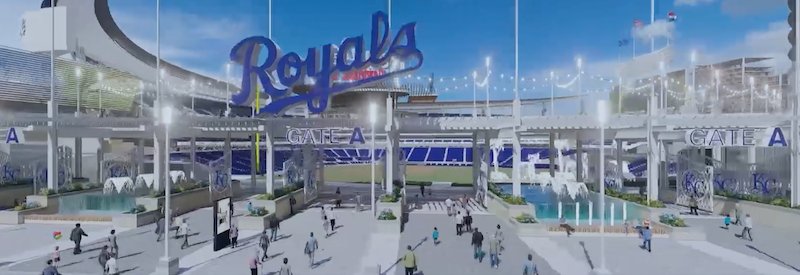
The Royals would like to build a new ballpark in greater downtown. (Rendering from Royals website)
On a downtown ballpark:
Barnes: “Now is the time to look at it seriously, whatever the end result will be will be hotly debated and that’s OK.
“I hope people will raise questions, educate themselves, look closely at the financial aspects of it and not make any snap decisions one way or the other.”
James: “I think there’s a very valid reason to give serious consideration to moving. I also think people ought to pay attention to the overall situation.
“There are two teams at that complex. What happens with one will have a major impact on the other. You can’t separate the two, they’re both under the same lease, they’re both looking for the same thing.
“They’re both talking about stadium issues. Be careful what you wish for, you may throw out one and wind up with none.”
Funkhouser: “This will not shock you, I would not spend a dime of public money. I would welcome private investment and maybe help with solving whatever issues there are.
“If you look at the issues, crime, housing, street maintenance, economic development, none of that is addressed or solved by where you put the baseball stadium.”
The streetcar?
Barnes: “We need to as rapidly as possible add those lines along Independence Boulevard and 18th Street into the eastern part of the city because that’s where the highest public transportation usage is.”
Funkhouser: “The trouble with the streetcar as it is now is it’s too small to actually have an impact. It needs to be a lot better. It is a key to equity.”
When asked why he didn’t pursue building a streetcar while mayor, he replied “I thought it was, to use Mayor Cleaver’s line, it was touristy frou frou. I thought it was too small to make a difference so it wasn’t a wise expenditure.”
James: “We have the best streetcar system in the country right now. I can prove it because I can show you a bunch of mayors who tried to emulate it and put a fare on it and it ain’t working.
“The economic activity on our streetcar line is phenomenal and will continue to get better.”


